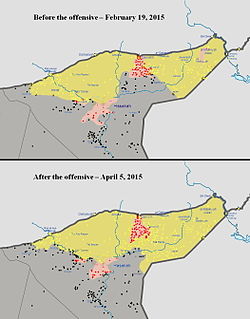
Al-Hasakah also known as Al-Hasakeh, Al-Hasaka or simply Hasakah, is the capital city of the Al-Hasakah Governorate and it is located in the far northeastern corner of Syria. With a population of 188,160 residents in 2004, Al-Hasakah is among the ten largest cities in Syria and the largest in the governorate. It is the administrative center of a nahiyah ("subdistrict") consisting of 108 localities with a combined population of 251,570 in 2004.

The Kurdish National Council is a Syrian Kurdish political organization funded by Iraqi Kurdistan and Turkey. While the KNC had initially more international support than the ruling Democratic Union Party (PYD) during the early years of the Syrian civil war and a strong supporter basis among some Syrian Kurdish refugees, the overwhelming popular support the PYD enjoys has eroded support for the KNC in Syrian Kurdistan.

The Eastern al-Hasakah offensive was launched in the Al-Hasakah Governorate during the Syrian Civil War, by the Kurdish People's Protection Units, Assyrian Christian militias, and allied Arab forces against the jihadist Islamic State of Iraq and the Levant, with the intent of retaking the areas of the Jazira Canton that had been captured by ISIL. Subsequently, the Syrian Armed Forces also launched an assault against the radical militants, without coordinating with the Kurds.

The Siege of Nubl and al-Zahraa during the Syrian Civil War was laid by rebels to capture two Syrian government-held towns north of Aleppo, after they had seized most of the northern countryside in July 2012. The siege was lifted on 3 February 2016, as a result of a Syrian government offensive.

The Al-Hasakah city offensive was launched during the Syrian Civil War by the Islamic State of Iraq and the Levant against the city of Al-Hasakah, which was held by both the Syrian Armed Forces and the Kurdish YPG.

The Battle of Al-Hasakah (2015) started as an offensive launched in the Al-Hasakah Governorate during the Syrian Civil War, in which the Islamic State of Iraq and the Levant attempted to capture the city of Al-Hasakah, which was divided into two areas held separately by the Syrian Armed Forces and the Kurdish YPG. On 17 July, YPG-led forces captured all of the roads and villages surrounding Al-Hasakah, fully besieging the ISIL militants remaining inside of the city. On 28 July, YPG-led forces and the Syrian Army expelled ISIL from most of Al-Hasakah, with two ISIL pockets persisting near the Al-Zuhour District and the southern entrance. On 1 August, the city was fully cleared of ISIL fighters.

The Battle of Zabadani (2015) started in early July 2015, during the Syrian Civil War, as a military offensive launched by the Syrian Army, and Hezbollah to capture the rebel-held town of Al-Zabadani.
The Palmyra offensive of July–August 2015 was a military operation launched during the Syrian Civil War by the Syrian Arab Army in July 2015, in an attempt to recapture the ISIL-held city of Tadmur, known in English as Palmyra.
The following is a timeline of the Syrian Civil War from January to July 2015. Information about aggregated casualty counts is found at Casualties of the Syrian Civil War.

Rojava–Syrian Arab Republic relations concern the military and political relations between the forces of the Ba'athist Syrian Arab Republic and those of the Autonomous Administration of North and East Syria, a de facto autonomous multi-ethnic region in Northeastern Syria, as well as its armed wing, the Syrian Democratic Forces (SDF).
The Rif Dimashq offensive , or the battle of "Allah al-Ghalib", was a battle launched by the rebels around Tall Kurdi, Adra and Harasta in Eastern Ghouta.
The following is a timeline of the Syrian Civil War from January to April 2016. Information about aggregated casualty counts is found at Casualties of the Syrian Civil War.

The Northern Aleppo offensive refers to a military operation launched northwest of Aleppo in early February 2016 by the Syrian Arab Army and its allies. The offensive successfully broke the three-year Siege of Nubl and Al-Zahraa, effectively cutting off the main supply route of the Syrian rebels from Turkey.

The 2016 Aleppo summer campaign started with a military operation launched on the northern outskirts of Aleppo in late June 2016, by the Syrian Arab Army. The aim of the offensive was to cut the last rebel supply line into Aleppo city.
The 2016 Latakia offensive, code-named Battle of Yarmouk, refers to a rebel operation launched in the northern Latakia Governorate in late June 2016. The aim of the offensive was to recapture the territory lost during the Army's offensive earlier in the year.

The Battle of al-Hasakah (2016) was a battle between the paramilitary police of the Asayish and the People's Protection Units (YPG), against the pro-government National Defence Forces and the Syrian Arab Army, backed by the Syrian Arab Air Force, in the city of al-Hasakah, Syria.

The Aleppo offensive of September–October 2016 was the military operation launched in Aleppo in late September 2016 by the Syrian Army and its allies aiming to capture all of the remaining rebel-held parts of the city of Aleppo. Rebel forces controlling East Aleppo at that time were primarily fighters of Fatah Halab, although a significant number of Jabhat Fateh al-Sham and Ahrar al-Sham fighters were also present.

For the Israeli army unit see; Golani Brigade

The al-Hasakah Governorate campaign was a multi-sided military conflict between Syrian government forces, Kurdish forces, armed Syrian opposition groups, and Salafist jihadist forces, including al-Qaeda's Islamic State of Iraq and the Levant and the al-Nusra Front in the al-Hasakah Governorate as part of the Syrian Civil War. The clashes began with the People's Protection Units (YPG)'s entrance into the civil war in July 2012 and spread across the governorate.















